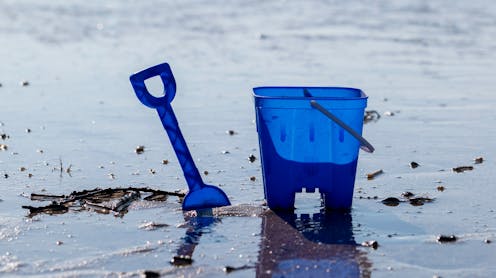If you scoop a bucket of water out of the ocean, does it get lower?
- Written by Dylan Irvine, Outstanding Future Researcher - Northern Water Futures, Charles Darwin University

If you scoop a bucket of water out of the ocean, does it get lower?
–Ellis, 6 and a half, Hobart
This is a great question Ellis! The short answer is yes, but the change in water level will be extremely tiny. You can actually test this idea at home.
For starters, you’ll need a glass of water and a teaspoon. Fill the glass almost to the top, and take note of the water level. Now, carefully remove a teaspoon of water. Can you see the difference in the water level? Maybe you can, but maybe not.
You could repeat this experiment in the kitchen sink, or a bathtub if you have one. The key point is that the water level does drop, but only by a very small amount. If you scoop a teaspoon of water out of the bathtub, you probably won’t see the difference with the naked eye.
Millions of buckets
So, let’s return to the ocean. It’s truly huge, especially compared to a bucket.
Let’s say that you have a bucket that fits ten litres. Using the information here, there are about 137 million, million, million buckets of water in the ocean (that is, all of Earth’s oceans combined).
I crunched the numbers. If you took a bucket of water from the ocean, the water level would drop by around 0.0000000000277 millimetre. You can see how small a millimetre is on your school ruler. We don’t have anything on Earth that can measure anything this small. For example, this is way, way, way smaller than even a single atom.
So, the more detailed answer to your question is: yes, the water level gets lower, but by such a small amount that we can’t even measure it.
But wait, there’s more
Earth is a really interesting place. When you take your bucket of water, all that water is moving through something called the water cycle.
Sea levels are actually constantly changing. Each year, a lot of water evaporates from the ocean. Some of it is even lost to outer space.
However, most of the evaporated water rains back down directly onto the ocean, or onto the ground, with that water making its way to rivers that eventually flow to the ocean. There is also a lot of water stored underground, and some of it makes its way to the ocean, as well.
So, if you poured your bucket of water onto the ground, eventually it would end up back in the ocean via the water cycle!
A few fun facts
There’s a lot to know about water. Some more fun facts (and big numbers):
There are 1,500,000,000,000,000,000 molecules of water (H₂O) in a single drop of water. That’s 1.5 million, million, million.
The oldest water in the world is estimated to have fallen as rain more than 1.6 billion years ago.
Most (about 98%) of the world’s fresh, liquid water is underground – that’s why it’s called groundwater.
Authors: Dylan Irvine, Outstanding Future Researcher - Northern Water Futures, Charles Darwin University





